As a caregiver, you may often wonder about the types of food your canine companion can and can’t eat. After all, their nutritional needs are different from ours. In this guide, we will delve deep into the world of canine nutrition, specifically focusing on foods that are harmful to dogs.
Understanding Canine Nutrition
Dogs, like humans, require a balanced diet to stay healthy. However, their diet is distinctly different from ours. They need a specific mix of proteins, carbohydrates, fruits, vegetables, and certain supplements.
It’s crucial to note that certain human foods can be toxic to dogs. Let’s look at some of these forbidden foods and the reasons why they are harmful.
Foods Harmful to Dogs
Here is a list of foods that are harmful to your dog:
- Chocolate: It contains theobromine, which is poisonous to dogs.
- Grapes and Raisins: These fruits can cause kidney failure in dogs.
- Onions and Garlic: They can damage a dog’s red blood cells, leading to anemia.
- Avocado: It contains persin, a toxin that can cause vomiting and diarrhea in dogs.
- Alcohol: Even small amounts can cause significant damage to a dog’s liver and brain.
Food Dogs Can’t Eat Chart
Let’s visualize these harmful foods in a chart for better understanding:
| Food | Harmful Substance | Effects on Dogs |
|---|---|---|
| Chocolate | Theobromine | Poisonous |
| Grapes & Raisins | Unknown | Kidney failure |
| Onions & Garlic | Disulfides and Sulfoxides | Anemia |
| Avocado | Persin | Vomiting, Diarrhea |
| Alcohol | Ethanol | Damage to liver and brain |
Safe Human Foods for Dogs
While many human foods are harmful to dogs, several are safe and even beneficial. These include:
- Carrots: Good for their teeth
- Apples: A source of vitamins A and C
- White Rice: Easy to digest and good for an upset stomach
- Fish: Rich in omega-3 fatty acids
Precautions When Feeding Your Dog
While feeding your dog, keep these precautions in mind:
- Always introduce new foods gradually.
- Avoid feeding them too much, as it can lead to obesity.
- Keep an eye out for any allergic reactions.
- Consult with your vet before making any significant changes to their diet.
What to Do if Your Dog Eats a Harmful Food
If your dog accidentally consumes any harmful food, take the following steps:
- Don’t panic: Stay calm so you can think clearly.
- Remove any remaining harmful food from their reach.
- Contact your vet immediately.
- Follow your vet’s instructions.
Frequently Asked Questions
Q1: Can I give my dog a small amount of chocolate?
- No, even small amounts of chocolate can be harmful to dogs.
Q2: Can dogs eat raw meat?
- Some vets recommend raw diets, but others warn of potential risks. It’s best to consult with your vet.
Q3: My dog ate grapes. What should I do?
- Contact your vet immediately. Grapes can cause kidney failure in dogs.
Q4: Can I give my dog milk?
- Some dogs are lactose intolerant, which can lead to gastrointestinal problems. It’s best to avoid.
Armed with this knowledge, you can ensure that your dog stays healthy and happy. Remember, when it comes to your dog’s diet, it’s always best to consult with your vet. They can provide the most accurate and personalized advice based on your dog’s breed, age, size, and overall health condition.



